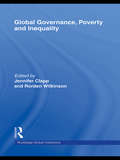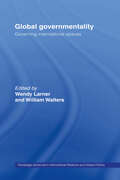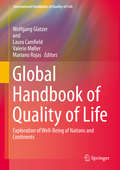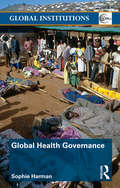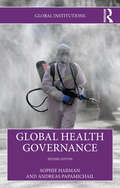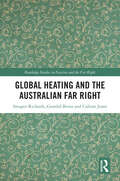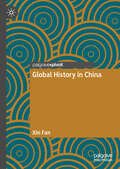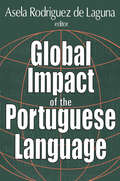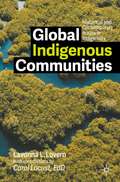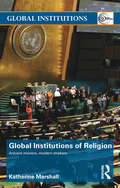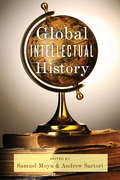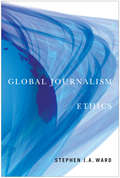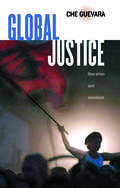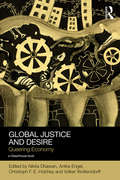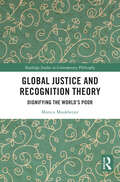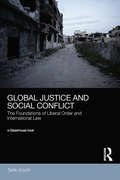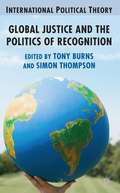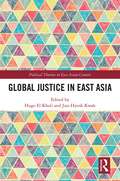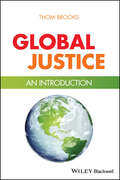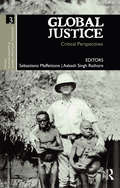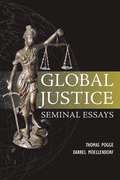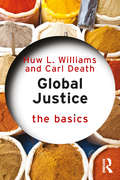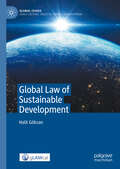- Table View
- List View
Global Governance, Poverty and Inequality (Global Institutions)
by Jennifer ClappA series of crises unfolded in the latter part of the first decade of the 21st Century which combined to exacerbate already profound conditions of global economic inequality and poverty in the world’s poorest countries. In 2007, the unsound lending practices that caused a collapse in the US housing market ushered in a broader economic crisis that reverberated throughout the global financial system. This economic shockwave had a global impact, triggering not just instability in other industrialized countries, but also in their developing world counterparts, also highlighting deficiencies in the current structures of global governance to protect the world’s poorest and most disadvantaged. This book offers answers to questions raised about the role of global governance in the attenuation and amelioration of world poverty and inequality. The contributors interrogate the role of systems of governance at a time of global economic crisis and continuing environmental degradation against a backdrop of acceleration in inequalities within and between communities and across the globe. Evaluating how existing systems can be reformed or redesigned to be more effective at addressing issues of poverty and inequality and providing a comprehensive discussion of a wide range of global governance initiatives this work will be essential reading for students and scholars of global governance, international relations and international organizations.
Global Governmentality: Governing International Spaces (Routledge Advances in International Relations and Global Politics #28)
by Wendy Larner William WaltersFoucault's thoughts on governmentality have made a significant impact on the studies of power and governance in modern societies. However, most studies of governmentality confine themselves to the exploration of power within nation-states. Global Governmentality extends Foucault's political thought towards international studies, exploring the governance of the global, the international, the regional and many other extra-domestic spaces.Combining historical and contemporary outlooks, this book offers innovative interdisciplinary explorations of such issues as international peacekeeping, refugees, political rationalities of security and neoliberalism, the spatiality of globalization, the genealogy of development, and the ethical governance of corporate activity.At a time when many of the geopolitical and economic certainties which framed international affairs are in flux, Global Governmentality is suggestive of new territories and lines for international analysis. It will be of interest to students and researchers of both governmentality and international studies.
Global Handbook of Quality of Life
by Mariano Rojas Wolfgang Glatzer Laura Camfield Valerie MøllerThis handbook provides a comprehensive historical account of the field of Quality of Life. It brings together theoretical insights and empirical findings and presents the main items of global quality of life and wellbeing research. Worldwide in its scope of topics, the handbook examines discussions of demographic and health development, the spread of democracy, global economic accounting, multi-item measurement of perceived satisfaction and expert-assessed quality of life and the well-being of children, women and poor people. It looks at well-being in specific regions, including North and Sub-Saharan Africa, Asia, South America and Eastern and Western Europe. In addition to contributions by leading and younger authors, the handbook includes contributions from International Organizations about their own work with respect to social reporting.
Global Health Governance (Global Institutions)
by Sophie HarmanIn the light of scares about potential pandemics such as swine fever and avian flu, the issue of global health and its governance is of increasing concern to scholars and practitioners of medicine, public health, social work, and international politics alike. Providing a concise and informative introduction to how global health is governed, this book: Explores the various ways in which we understand global health governance Explains the "nuts and bolts" of the traditional institutions of global health governance, highlights key frameworks and treaties and their relative successes and failings Examines the actors in global health governance, their purpose, influence and impact Offers an in depth analysis of the effectiveness of global health interventions, focusing particularly on HIV/AIDS, tuberculosis and malaria. Highlighting the wide variety of actors, issues and approaches involved, this work shows the complex nature of global health governance, forcing the reader to examine who or what really governs global health, to what outcome, and for whom.
Global Health Governance (ISSN)
by Sophie Harman Andreas PapamichailFully updated for the second edition, this text provides a concise and informative introduction to how global health is governed, exploring the ways in which we understand global health governance, exposing its complex nature, and asking who or what really governs global health, to what outcome, and for whom.Governing outbreaks, emergencies, pandemics, access to medicines, non-communicable diseases, and the financing of fully functioning health systems remain among the biggest challenges national and international policymakers and practitioners face. While COVID-19 made apparent the tensions, contestations, and complexity of governing health threats, to understand what could and should have worked during the pandemic requires a comprehensive understanding of the actors, approaches, and issues that make up global health.Divided into three parts, the book examines the different actors who participate in global health governance, their powers, interests, ways of working, relationships, and how their roles have changed over time. It explores different approaches to global health governance, focusing on the ways global health issues have been conceptualised and understood, and how this has shaped global health politics and the ways the key actors work. Finally, it examines different issues, and how the actors and their approaches have addressed health emergencies and everyday health inequities.Global Health Governance provides a comprehensive introduction to researchers and students new to the field of global health governance, and a vital resource and reference point for established scholars and practitioners working in the field of global health.
Global Heating and the Australian Far Right (Routledge Studies in Fascism and the Far Right)
by Imogen Richards Gearóid Brinn Callum JonesGlobal Heating and the Australian Far Right examines the environmental politics of far-right actors and movements in Australia, exploring their broader political context and responses to climate change. The book traces the development of far-right pseudo-environmentalism and territorial politics, from colonial genocide and Australian nationalism to extreme-right political violence. Through a critical analysis of news and social media, it reveals how denialist and resignatory attitudes towards climate change operate alongside extreme right accelerationism, in a wider Australian political context characterised by reactionary fossil fuel politics and neoliberal New Right climate change agendas. The authors scrutinise the manipulation of environmental politics by contemporary Australian far- and extreme-right actors in cross-national online media. They also assess the political-ideological context of the contemporary far right, addressing intergovernmental approaches to security threats connected to the far right and climate change, and the emergence of radical environmentalist traditions in ‘New Catastrophism’ literature. The conclusion synthesises key insights, analysing the mainstreaming of ethnonationalist and authoritarian responses to global heating, and potential future trajectories of far-right movements exploiting the climate crisis. It also emphasises the necessity for radical political alternatives to counter the far right’s exploitation of climate change. This book will be of interest to researchers of climate change, the far right, neoliberal capitalism, extremism and Australian politics.
Global Heating and the Australian Far Right (Routledge Studies in Fascism and the Far Right)
by Imogen Richards Gearóid Brinn Callum JonesGlobal Heating and the Australian Far Right examines the environmental politics of far-right actors and movements in Australia, exploring their broader political context and responses to climate change.The book traces the development of far-right pseudo-environmentalism and territorial politics, from colonial genocide and Australian nationalism to extreme-right political violence. Through a critical analysis of news and social media, it reveals how denialist and resignatory attitudes towards climate change operate alongside extreme right accelerationism, in a wider Australian political context characterised by reactionary fossil fuel politics and neoliberal New Right climate change agendas. The authors scrutinise the manipulation of environmental politics by contemporary Australian far- and extreme-right actors in cross-national online media. They also assess the political-ideological context of the contemporary far right, addressing intergovernmental approaches to security threats connected to the far right and climate change, and the emergence of radical environmentalist traditions in ‘New Catastrophism’ literature. The conclusion synthesises key insights, analysing the mainstreaming of ethnonationalist and authoritarian responses to global heating, and potential future trajectories of far-right movements exploiting the climate crisis. It also emphasises the necessity for radical political alternatives to counter the far right’s exploitation of climate change.This book will be of interest to researchers of climate change, the far right, neoliberal capitalism, extremism and Australian politics.
Global History in China
by Xin FanThis book explores global history as an emerging field of scholarly studies in China today. Readers are invited to rethink the origin of global history in China and to examine its current state. Chinese scholarship is rooted in a warm appreciation of globalization in the age of Opening-up and Reform and presented as a trendy transnational intellectual movement at the opening of the twenty-first century. On the one hand, global history claims an identity of the “new” eager to criticize the Eurocentric bias embedded in the narratives of the “old,” ones from world history; on the other hand, as an emerging field, it is yet to face competitions from national histories and area studies, which are nurtured by latest state initiatives with outspoken political agendas. As a whole, global history captures Chinese scholars’ tenacious interest in studying globalization through the lens of history. This book will interest historians, China scholars, and those trying to grasp the “Chinese perspective” on the world.
Global Impact of the Portuguese Language
by Asela Rodriguez de LagunaWithin the cultural and literary context of contemporary Portugal and Western literature, 1998 was unquestionably the year that Portuguese writing gained international recognition as JosU Saramago became the first Portuguese writer ever to receive the Nobel Prize in literature. Readers who had never thought about Portuguese letters began to consume his books and, most importantly, opted for expanding their reading lists to include other important writers not only from Portugal, but from Portuguese-speaking well beyond the borders of Portugal. Global Impact of the Portuguese Language is a collection of Portuguese writing that is as rich in content and broad in scope as the diversity of its topics and writing modes of its contributors. The book is divided into three major parts. Part 1, "Different Cultural Perspectives of Portuguese Writing," contains thirteen chapters in which the first and opening one, "Portugal: The New Frontier" ably sets the stage for the book by examining from a cultural perspective how Portugal, a peripheral country in the new world system, serves as a microcosm of the problems of cultural intercommunication in today's world. Subsequent chapters are grouped in three categories: "The Voices of the Writers," "Critical Approaches to Cames," and "Fictionalizing the Nation." Part 2, "Portuguese Language and Literature Outside Portugal," comprises one section devoted to the Portuguese language in Africa, followed by studies about Portuguese discoveries as part of the historical process of remembering and forging one's identity, and finally a comprehensive historical development of Portuguese writing, both in Portuguese and English, in the United States. Part 3, "Portuguese Literature and Criticism Available in English: Suggested Readings" details the recent literary happenings which point to a possible renaissance in Portuguese literary production. The concluding part of this volume offers a short, comprehensive listing of anthologies, general studies, and the most popular translations of the best of Portuguese writing from Portugal and Africa. This lively volume constitutes a first pioneering effort to contribute to a deepening appreciation and understanding of Portuguese writing. Anyone interested in ethnic writing will find this book an invaluable education resource with which to begin an exploration of Portuguese writing in the United States. Asela Rodriguez de Laguna is associate professor of Spanish and director of the Hispanic Civilization & Language Studies Program. She is the author of Notes on Puerto Rican Literature: Images and Identities: An Introduction, and editor of Images and Identities: The Puerto Rican in Two World Contexts.
Global Indigenous Communities: Historical and Contemporary Issues in Indigeneity
by Lavonna L. LovernGlobal Indigenous Communities is a wide-ranging examination of global Indigenous communities that continue to suffer from colonization and assimilation issues, including intergenerational trauma. The scholarship is interdisciplinary; it is not easily categorized as sociology, anthropology, ethnography, or philosophy, but cuts across all of these disciplines, as well as Indigenous methodologies. The book not only presents an academic study of Indigenous issues, covering Indigenous community life, religion, the environment, economic matters, education, and healthcare, but also incorporates contributions from Carol Locust, EdD, that reflect on her lifetime of experience in Indigenous education and healthcare. Each studied prism of Indigenous life is revealed to be impacted by the experience of intergenerational trauma that results from continued colonization. Ultimately, this book aims to bridge the communication gap between Western and Indigenous scholarship and readership, artfully combining Indigenous approaches with a traditional academic style.
Global Institutions of Religion: Ancient Movers, Modern Shakers (Global Institutions)
by Katherine MarshallThis work fills a significant gap in the current literature by providing a concise introduction to religious institutions and an insightful analysis of their role in world affairs. Focusing on formal institutions specifically dedicated to governing religious communities, the work examines the intersections between religious and other global institutions, set against the fundamental question: why and how do these intersections matter? The work explores the role of religion within key issues including Human rights Human security International development and humanitarian relief Climate change Moral responsibilities The new forms that religious institutions are taking, their fit with human rights and democratic ideals, their changing nature in plural societies, are a highly relevant part of the global institutional picture and this book is essential reading for all students and scholars of global institutions, international relations and religion.
Global Intellectual History (Columbia Studies in International and Global History)
by Samuel Moyn Andrew SartoriWhere do ideas fit into historical accounts that take an expansive, global view of human movements and events? Teaching scholars of intellectual history to incorporate transnational perspectives into their work, while also recommending how to confront the challenges and controversies that may arise, this original resource explains the concepts, concerns, practice, and promise of "global intellectual history," featuring essays by leading scholars on various approaches that are taking shape across the discipline.The contributors to Global Intellectual History explore the different ways in which one can think about the production, dissemination, and circulation of "global" ideas and ask whether global intellectual history can indeed produce legitimate narratives. They discuss how intellectuals and ideas fit within current conceptions of global frames and processes of globalization and proto-globalization, and they distinguish between ideas of the global and those of the transnational, identifying what each contributes to intellectual history. A crucial guide, this collection sets conceptual coordinates for readers eager to map an emerging area of study.
Global Journalism Ethics
by Stephen J.A. WardStephen Ward argues that present media practices are narrowly based within the borders of single country and thus unable to successfully inform the public about a globalized world. Presenting an ethical framework for work in multimedia, the author extends John Rawl's theories of justice and the human good to redefine the aims for which journalism should strive and then applies this new foundation to issues such as the roles of patriotism and objectivity in journalism. An innovative argument that presents a necessary corrective to contemporary media practices, Global Journalism Ethics is a theoretically rich study for journalists on the air, in print, and on the internet.
Global Justice
by Ernesto Che Guevara María del Ariet GarcíaIs there an alternative to the neoliberal globalization that is ravaging our planet? Collected here are three classic works by Che Guevara, including his essay, "Socialism and Man in Cuba.""The powerful of the earth should take heed: deep inside that T-shirt where we have tried to trap him, Che's eyes are still burning with impatience." Ariel Dorfman
Global Justice and Desire: Queering Economy (Social Justice)
by Nikita Dhawan Antke Engel Christoph H.E. Holzhey Volker WoltersdorffEmploying feminist, queer, and postcolonial perspectives, Global Justice and Desire addresses economy as a key ingredient in the dynamic interplay between modes of subjectivity, signification and governance. Bringing together a range of international contributors, the book proposes that both analyzing justice through the lens of desire, and considering desire through the lens of justice, are vital for exploring economic processes. A variety of approaches for capturing the complex and dynamic interplay of justice and desire in socioeconomic processes are taken up. But, acknowledging a complexity of forces and relations of power, domination, and violence – sometimes cohering and sometimes contradictory – it is the relationship between hierarchical gender arrangements, relations of exploitation, and their colonial histories that is stressed. Therefore, queer, feminist, and postcolonial perspectives intersect as Global Justice and Desire explores their capacity to contribute to more just, and more desirable, economies.
Global Justice and Recognition Theory: Dignifying the World’s Poor (Routledge Studies in Contemporary Philosophy)
by Monica MookherjeeIn the light of intense international focus on ongoing forms of world poverty, this book examines the potential of the concept of recognition in contemporary political philosophy to respond morally to this dire condition. This book uses recognition theories to develop a two-tiered response to the problem of global poverty. First, it highlights non-degradation, non-humiliation and the avoidance of social suffering as essential components to the agency of the very poor. This runs counter to liberal arguments that focus only on the deficit of basic material interests. Second, even if universal conditions of agency are met, many of the world’s extreme poor may still suffer domination. The book argues that empowering the world’s poor to resist domination is an essential response to global poverty. By conceiving poverty in terms of agency and empowerment, this book highlights the transnational relevance of recognition theory to one of the most crucial problems affecting a rapidly globalizing world. Global Justice and Recognition Theory will be of interest to scholars and advanced students working in social and political philosophy, political theory, and global justice.
Global Justice and Social Conflict: The Foundations of Liberal Order and International Law
by Tarik KochiGlobal Justice and Social Conflict offers a ground-breaking historical and theoretical reappraisal of the ideas that underpin and sustain the global liberal order, international law and neoliberal rationality. Across the 20th and 21st centuries, liberalism, and increasingly neoliberalism, have dominated the construction and shape of the global political order, the global economy and international law. For some, this development has been directed by a vision of ‘global justice’. Yet, for many, the world has been marked by a history and continued experience of injustice, inequality, indignity, insecurity, poverty and war – a reality in which attempts to realise an idea of justice cannot be detached from acts of violence and widespread social conflict. In this book Tarik Kochi argues that to think seriously about global justice we need to understand how both liberalism and neoliberalism have pushed aside rival ideas of social and economic justice in the name of private property, individualistic rights, state security and capitalist ‘free’ markets. Ranging from ancient concepts of natural law and republican constitutionalism, to early modern ideas of natural rights and political economy, and to contemporary discourses of human rights, humanitarian war and global constitutionalism, Kochi shows how the key foundational elements of a now globalised political, economic and juridical tradition are constituted and continually beset by struggles over what counts as justice and over how to realise it. Engaging with a wide range of thinkers and reaching provocatively across a breadth of subject areas, Kochi investigates the roots of many globalised struggles over justice, human rights, democracy and equality, and offers an alternative constitutional understanding of the future of emancipatory politics and international law. Global Justice and Social Conflict will be essential reading for scholars and students with an interest in international law, international relations, international political economy, intellectual history, and critical and political theory.
Global Justice and the Politics of Recognition
by Simon Thompson Tony BurnsTwo issues have been central within political philosophy in the last decade or so. The first is the debate over 'the politics of distribution versus the politics of recognition, ' which is usually associated with the work of Axel Honneth and Nancy Fraser. The second is discussion of the phenomenon known as globalization, focusing on the notions of cosmopolitanism and global justice. This book explores the relationship between these two issues. It considers not only the global dimension of the politics of recognition, but also how recognition theory can provide new insights into our understanding of problems of global justice, especially those of a non-distributive nature. A number of the contributors consider the relevance of Hegel's theory of recognition for our understanding of these issues.
Global Justice in East Asia (Political Theories in East Asian Context)
by Jun-Hyeok Kwak Hugo El KholiAs a fascinating study of global justice in Asia, this book presents a series of contributions reflecting upon the conditions of a greater involvement of East Asian traditions of thought in the debate on global justice. Including chapters on diverse issues such as global social inequalities, human rights practice and the functioning of international institutions, this book examines the political cultures of East Asia in order to help political theorists better appraise the distinctiveness of non‐Western ideas of justice. Confirming the persistence of a strong social ethos, the contributions also demonstrate the long-lasting influence of Buddhism, Taoism and Confucianism in shaping East Asian public conceptions of justice. Bringing much needed non-Western voices to the global justice debate, this book will appeal to students and scholars of politics, law and philosophy, as well as activists involved in the global justice movement.
Global Justice, State Duties
by Malcolm Langford Wouter Vandenhole Martin Scheinin Willem van Genugten Malcolm Langford Wouter Vandenhole Martin Scheinin Willem Van GenugtenThe rise of globalization and the persistence of global poverty are straining the territorial paradigm of human rights. This book asks if states possess extraterritorial obligations under existing international human rights law to respect and ensure economic, social, and cultural rights and how far those duties extend. Taking a departure point in theory and practice, the book is the first of its kind to analyze the principal cross-cutting legal issues at stake: the legal status of obligations, jurisdiction, causation, division of responsibility, and remedies and accountability. The book focuses specifically on the role of states but also addresses their duties to regulate powerful nonstate actors. The authors demonstrate that many key issues have been resolved or clarified in international law while others remain controversial or await the development of further practice, particularly the scope of jurisdiction and the quantitative dimension of extraterritorial obligations to fulfill.
Global Justice: An Introduction
by Thom BrooksA fascinating and engaging discussion of the central issues in the contemporary study of global justice In Global Justice: An Introduction, distinguished legal and political philosopher Thom Brooks delivers an authoritative and accessible introduction to foundational concepts in the study of justice that are common to societies around the globe. The author covers fundamental and contemporary concepts, exploring and explaining critical issues, including sovereignty, severe poverty, environmental justice, and human rights. Each chapter explores a unique subject and includes illuminating examples from current affairs around the world, as well as a selection of further reading material that will add depth to reader understanding. Designed to be used as the companion text to The Global Justice Reader, Revised Edition, this book also stands alone as a resource offering expert introductory treatments of the key issues animating contemporary discussion in the field of global justice. Readers will also find: Thorough introductions to sovereignty, the rights to self-determination, human rights, and nationalism and patriotism Comprehensive explorations of cosmopolitanism, immigration and citizenship, and global poverty Practical discussions of the concept of just wars, terrorism, and feminist global justice Extensive treatments of climate change as it relates to the international order and environmental justicePerfect for students of philosophy, politics, political science, and law, Global Justice: An Introduction will be of particular interest to academics and general readers seeking coverage of subjects in international law, jurisprudence, and political and moral philosophy.
Global Justice: Critical Perspectives (Ethics, Human Rights and Global Political Thought)
by Sebastiano Maffettone; Aakash Singh RathoreThe global justice debate has been raging for forty years. Not merely the terms and conditions, but, more deeply, the epistemic, existential and ethical grounds of the international relations of persons, states and institutions are being determined, debated and negotiated. Yet the debate remains essentially a parochial one, confined largely to Western intellectuals and institutional spaces. An Introduction to the field is therefore still urgently required, because it remains necessary to include more ‘global’ voices into this debate of worldwide reach and significance. The book addresses this need in two closely related ways. In Part I, it introduces the main contours of the debate by reproducing three of the most fundamental and influential essays that have been composed on the topic — essays by Peter Singer, Thomas Pogge and Thomas Nagel. In Part II, it makes a decisive critical intervention in the main stream of the debate through exposing the participation deficit afflicting the theorization of global justice. This part begins with a well-known essay by Amartya Sen, who famously referred to the ‘parochialism’ of the global justice debate in making a break with the Rawlsian paradigm that has dominated the field until now. Finally, a series of lively essays newly composed for this volume reflect on the possibilities for deparochializing global justice opened up by Sen’s work in this area. The book will be useful for students of international relations, postcolonial studies, political theory, and social and political philosophy, as well as for those engaged in studies of globalization or global studies.
Global Justice: Seminal Essays
by Thomas Pogge Darrel MoellendorfCarefully selected papers by political philosophers and political theorists on global justice.
Global Justice: The Basics (The Basics)
by Carl Death Huw L. WilliamsGlobal Justice: The Basics is a straightforward and engaging introduction to the theoretical study and practice of global justice. It examines the key political themes and philosophical debates at the heart of the subject, providing a clear outline of the field and exploring: the history of its development the current state of play its ongoing interdisciplinary development. Using case studies from around the world which illustrate the importance of the debates at the heart of global justice, as well as activist campaigns for global justice, the book examines a wide range of theoretical debates from thinkers worldwide, making it ideal for those seeking a balanced introduction to global justice.
Global Law of Sustainable Development (Global Issues)
by Halil GöksanThis book discusses the emergence of a new concept of law at the global level in the field of sustainable development. It examines the four-decade-long evolution of the concept of sustainable development from the Stockholm Conference of 1972 until the adoption of the Sustainable Development Goals in 2015. It brings forward a step-by-step guide for exploring the law-like quality of global norms from a legal positivist and legal pluralist perspective.
